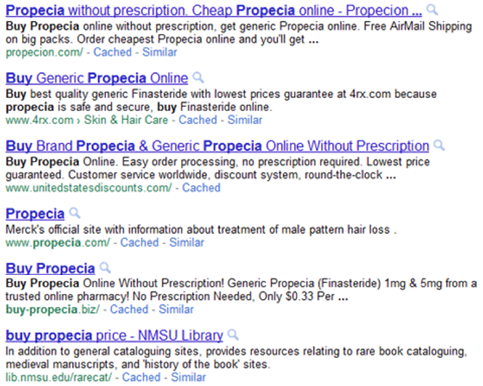Chapter 1: White Hat SEO: It F@$#ing Works
Editor's Note: This article was originally posted on The Moz Blog in April 2011 in response to an off-site post that dismissed the value of white hat SEO. Since then, Google has released many updates to its search algorithm. Most prominent among the updates are Penguin, which devalues spammy backlinks and over-optimized sites, and Panda (originally launched February 2011 as Panda/Farmer), which hits sites with thin content and link farms hard.
I hate web spam. I hate what it's done to the reputation of hardworking, honest, smart web marketers who help websites earn search traffic. I hate how it's poisoned the acronym SEO, a title I'm proud to wear. I hate that it makes legitimate marketing tactics less fruitful. And I hate, perhaps most of all, when it works.
Here's a search for “buy propecia,” which is a drug I actually take to help prevent hair loss. (My wife doesn't think I'd look very good sans hair.)

Like most search results in the pharma sphere, it's polluted by pages that have artificially inflated their rankings. This is obvious to virtually everyone who's even minimally tech-savvy, and it has three terrible results:
1. Marketers and technologists who observe results like this equate SEO with spamming. If you've read a Hacker News (http://news.ycombinator.com) or StackOverflow (http://stackoverflow.com) thread ...
Get Inbound Marketing and SEO: Insights from the Moz Blog now with the O’Reilly learning platform.
O’Reilly members experience books, live events, courses curated by job role, and more from O’Reilly and nearly 200 top publishers.

